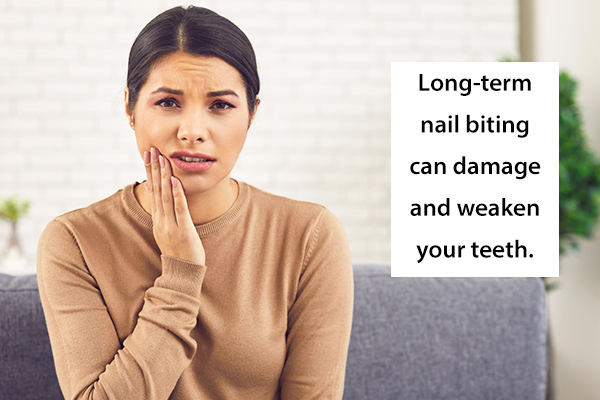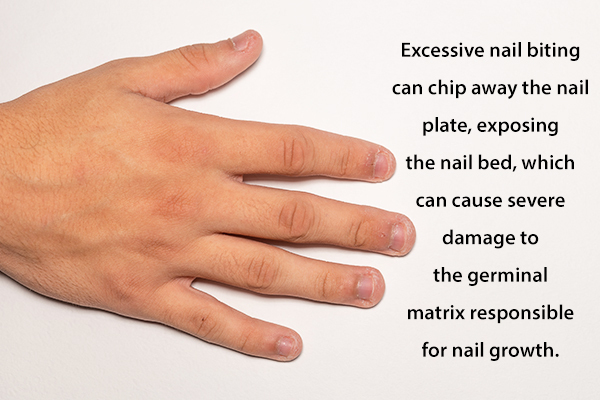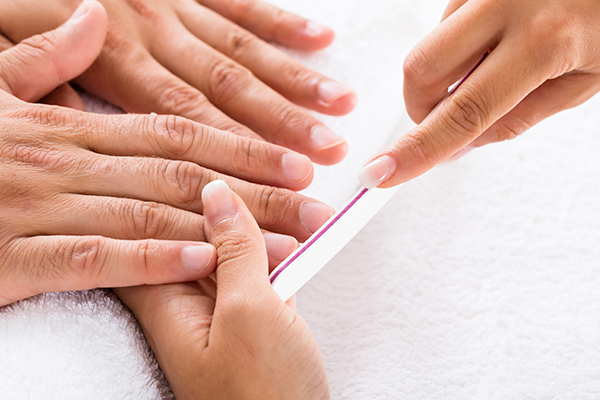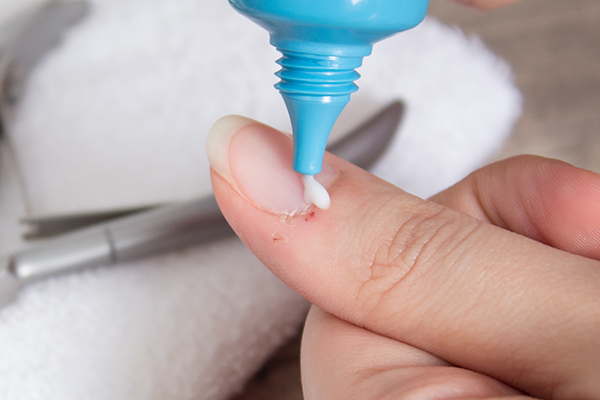In this article:
Onychophagia is the clinical term for the repetitive and compulsive habit of biting your nails and the surrounding skin.

People tend to do it involuntarily when they are under some form of mental distress. It is a coping mechanism that helps them relieve stress, anxiety, nervousness, or passive aggression. (1) This is a type of obsessive-compulsive disorder that stems from a deep-seated psychological unrest. (2)
Some people tend to pick at their nails aimlessly when stressed. These are also involuntary behaviors triggered by stress/anxiety/nervousness, but they rarely cause any health issues, whereas nail-biting does.
Nail-biting usually sets in at a young age and can gradually resolve as one grows older, but some people grapple with it even in adulthood.
Nearly 60% of all children bite their nails occasionally, but some of them grow out of this habit when they enter adolescence, decreasing the incidence to 45%. This number goes further down to 21% as the affected population enters adulthood.
Moreover, this problem tends to run in the family and is usually shared by identical twins. (2)
Why Nail-Biting Is Harmful to Health
Nail-biting can damage your health in the following ways:
1. Increases the risk of infection
Your nails collect a lot of germs, dirt, and other impurities that get transferred to your mouth and then to your stomach. This can result in oral and gastrointestinal infections.
For instance, nails often harbor pathogenic bacteria that can trigger severe stomach infections, such as E. coli and salmonella. (3)
Biting also causes tears in the skin around the nails, peeling of the cuticles, and chipping away of the nail enamel. As a result, the nail bed is exposed to germs that can infect the soft tissue.
One such infection is paronychia, (4) which affects the skin surrounding your nails and is characterized by swelling, redness, and pus. (5) The doctor will prescribe antibiotics or antifungals to treat such nail infections.
2. Causes dental damage

Long-term nail-biting can also damage and weaken your teeth. (6) The constant grinding against the hard surface of the nail gradually chips away your tooth enamel and can even shift your teeth shift inside your mouth. This results in faulty dental occlusion or misaligned teeth.
If you wear braces, the force and friction caused by biting your nails can damage the wired device or shift it out of place, which can further ruin your tooth alignment.
3. Can lead to hangnails or ingrown nails
People who have the habit of chewing their nails are more prone to hangnails or ingrown nails. Hangnails are the jagged, pointy, stiff slivers of torn skin that stick out of the border of your fingernails, whereas ingrown nails grow inside the skin surrounding your nails, causing pain and infection in various cases.
Hangnails and ingrown nails make you more susceptible to infections that spread fast unless treated with antibiotics, such as cellulitis. This is because both these conditions compromise your skin barrier, which allows germs to penetrate the underlying tissue, triggering an infection.
4. Can cause nail deformities
Compulsive nail-biting can cause severe damage to the soft tissue under your nail plate (nail bed), including the germinal matrix, which is responsible for 90% of nail growth.
The physical trauma caused by sinking your teeth repeatedly into the nails can lead to the formation of deep horizontal burrows in the nail, which are known as ridges. (7) Ridges are nail deformities that indicate temporary or, in severe cases, hampered nail growth.
5. Can damage the nail bed and hamper nail growth

Excessive nail-biting can chip away the nail plate, exposing the nail bed, which can cause severe damage to the germinal matrix responsible for nail growth. (2) Plus, the tissue underneath your nail bed is now open to bacterial infections, which also affect nail growth.
6. Impairs quality of life
Poor nail hygiene negatively affects your self-esteem. Chipped, dirty, or stained nails, torn cuticles, and damaged skin around the nails can make you self-conscious about your hands, especially while interacting with others in a personal or work setting. This self-consciousness feeds anxiety and stress, which can further prompt you to bite your nails. (8)
Properly groomed hands and nails can make you feel more attractive, which will bolster your confidence.
Self-Care and Tips to Prevent Nail-Biting
Nail-biting is usually a compulsive, involuntary urge that can be tough to control, but there are things you can do to kick this habit and avoid its associated health problems.

Here are some self-care tips and preventive measures that would help you maintain strong, healthy nails, which can give you beautiful hands and boost your confidence:
- Trim and file your nails regularly.
- Carry a trimmer or clipper with you at all times.
- Use a nail brush or hand wash and water to thoroughly clean the underside of your nails during hand washing.
- Ensure optimal hygiene by cleaning and sterilizing all your nail grooming tools before and after every use.
- Never pull out your cuticles, as this can tear the surrounding skin, loosen the nail plate, and expose your nail bed. Instead, carefully cut the overgrown bits with a pair of scissors or push them back in with a cuticle pusher, which is a stick-like tool specially designed for this purpose.
- Don’t forcefully pluck out hangnails or ingrown nails as this can do more harm than good. Use a trimmer to remove hangnails, and consult a professional dermatologist for ingrown nails.
- Coat your nails with foul-tasting nail paints. The terrible taste will make you think twice before you put your finger in your mouth.
- Go for manicures from time to time to keep your nails in the best of condition.
- Practice yoga, meditation, and other activities that calm your mind and body. Relieving stress, anxiety, and other such triggers will inadvertently help curb your nail-biting urges.
- Wear gloves, artificial nails, or apply Band-Aids around your fingertips so that your teeth are unable to dig through the outer cover into your nails. This will inadvertently deter nail-biting.
- Stay active. Other than keeping you physically fit, regular exercise helps release happy hormones, which uplift your mood and relieve stress. Less stress will help you control your nervous tendencies such as compulsive nail-biting. You can go for any form of exercise that suits you, but the aim is to do it regularly.
- Wear a rubber band around your wrist and snap it whenever you find yourself biting your nails or feel the urge to do so. This negative reinforcement will gradually train your mind to override these compulsive tendencies and deter nail-biting. This technique is also known as aversion therapy. (9)
ALSO READ: 9 Ways to Stop Nail Biting
General Queries
How do I repair the skin around my nails after years of biting?

Creams containing betamethasone and salicylic acid will help reduce swelling, itching, and redness. Apply a thin layer on your skin every night before bed. Wash your hands thoroughly the next morning.
Minimize the usage of the creams as the skin starts to improve. Perform a patch test to eliminate the risk of adverse skin reactions or allergies. Consult a dermatologist in the case of severe skin damage.
Is nail polish bad for nails?
Nail polishes incorporate an extensive list of chemical ingredients. Too much or improper use can cause staining, which makes your nails look dirty and unhealthy. Other than that, it does not cause any real harm.
Final Word
The first step to stop nail-biting is to understand why you are biting your nails. This compulsive behavior is rooted in some form of repressed stress or anxiety that needs to be resolved or managed in order to break away from the habit.
However, bear in mind that kicking this habit will not happen overnight. It will take a lot of patience and dedicated effort to overcome such deeply entrenched tendencies, especially since they are involuntary.
You will have to slowly train your mind to get rid of such default behaviors. Try the tips mentioned above to get started on this journey, but if they don’t bear any fruit, seek professional help.
- Was this article helpful?
- YES, THANKS!NOT REALLY


